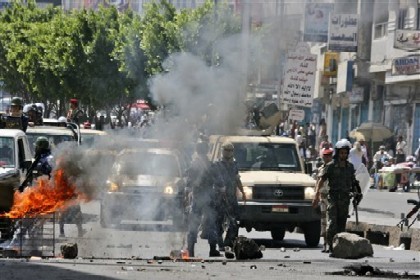Yemen Crackdown Kills 19 as U.S. Ups Pressure
إقرأ هذا الخبر بالعربية
Gunmen killed three protesters tearing up posters of President Ali Abdullah Saleh on Thursday, raising to 19 the death toll in 24 hours and prompting Washington to say the time has come for a transfer of power.
Pro-Saleh gunmen on the roof of the ruling party's headquarters in al-Bayda, 210 kilometers southeast of Sanaa, opened fire at demonstrators tearing up posters of Saleh, witnesses and protest organizers said.
Seven protesters were also wounded.
In central Taez, Yemen's second largest city, central security forces and units from the Republican Guard opened fire to disperse the latest protest in Jamal Street.
Dozens of protesters were wounded, said a medic at a field hospital in Freedom Square, the focal point of protests in Taez.
Thursday's crackdown came after a day of heavy bloodshed during protests.
In Sanaa, 12 people were killed and 340 wounded on Wednesday as security forces and plainclothes gunmen fired at protesters marching from University Square towards the government headquarters, medics and witnesses said.
Elsewhere, police shot dead two protesters in Taez, and two others in the town of Dhamar and the city of Hudayda.
"People want to march to the palace" of President Saleh, the protesters chanted, in an apparent escalation of their 15-week push to oust him.
The interior ministry said protesters had attempted to break security cordons to "storm the radio (building) and government headquarters."
It added that opposition gunmen positioned in a nearby building opened fire, resulting in the death of one protester and the wounding of others, the official Saba news agency reported.
Besides gunfire and tear gas, security forces also used hot water on protesters at University Square, scalding at least 12 of them, a medic said.
Tension was mounting ahead of Friday rallies arranged by both sides as they have done on the Muslim weekly day of prayers since the start of the unrest in late January.
The ruling party wants to mark Friday as a "day of unity" while the opposition has dubbed it a "day of determination."
Armored troops led by dissident General Ali Mohsen al-Ahmar have set up a cordon around University Square, dubbed "Change Square," to protect camping protesters from possible attack by Saleh loyalists.
On Thursday, Ahmar issued a statement condemning what he called the "brutal and barbaric" repression and calling on government troops to disobey orders and refrain from firing at protesters.
"Do not carry out orders from the regime to attack protesters and their peaceful demonstrations," he said, adding that it was a "heinous crime not approved by any law."
The latest escalation came after neighboring Gulf Cooperation Council states urged all sides in Yemen to sign a transition plan aimed at ending the political bloodshed.
Saleh has stalled by refusing to sign in his capacity as a president, insisting on endorsing the agreement as the leader of the ruling General People's Congress, contrary to the demands of the opposition.
But the United States, a long-time backer of Saleh, has thrown its support behind the GCC plan and urged Saleh to sign a deal "now."
Washington "is deeply concerned by recent violence throughout Yemen, and joins (the European Union) in strongly condemning these troubling actions," State Department deputy spokesman Mark Toner said.
"We call on the Yemeni security forces to exercise maximum restraint, refrain from violence, and respect the rights of the Yemeni people to freely and peacefully assemble and express their views."
And Washington called "on all parties to sign and implement the terms of the agreement now to ensure an orderly, peaceful transition of power."
The GCC plan proposes the formation of a government of national unity, Saleh transferring power to his vice president and resigning after 30 days, a day after parliament passes a law granting him and his aides immunity.
Around 175 people have been killed in the anti-government protests.



